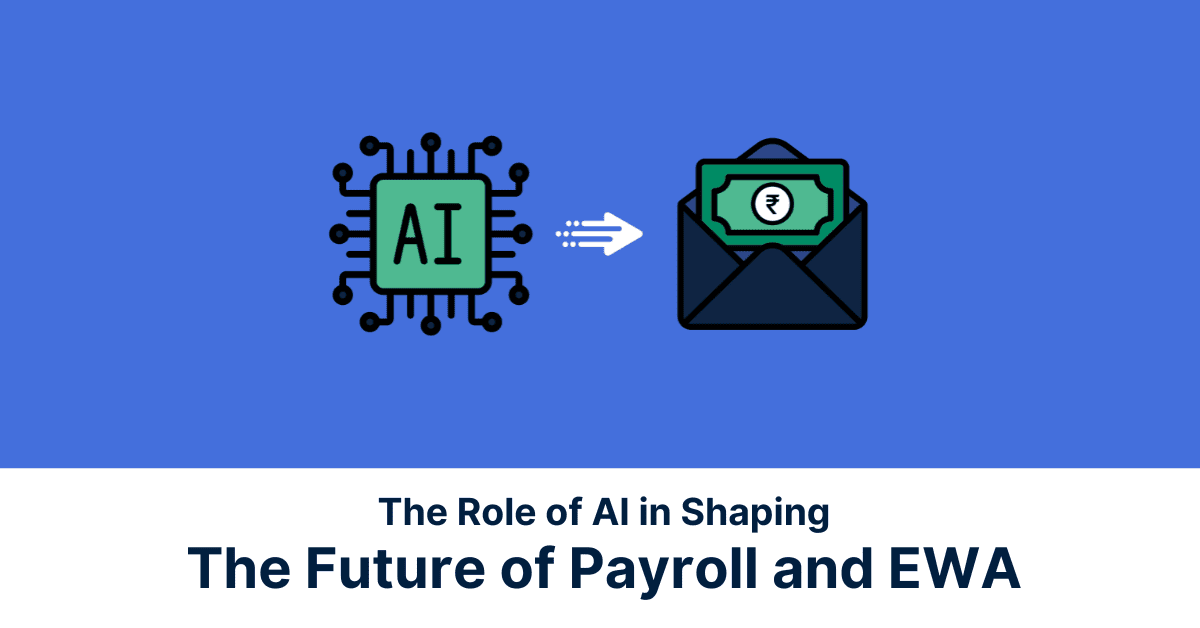Financial stress is no stranger when it comes to affecting the wellbeing of employees. It can significantly impact employee productivity and morale. According to data from Deloitte, financially stressed employees in India cost companies around $14 billion annually due to factors like absenteeism, lower productivity, and attrition caused by poor mental health linked to financial stress.
To address this growing concern, many forward-thinking organisations are implementing employer lending programs. These programs provide employees with access to affordable loans, helping them overcome financial challenges and improve their financial health.
Employers display a genuine commitment to their employees’ financial well-being when they create provisions for accessing loans. This proactive approach not only contributes to employee financial wellness but also positively impacts the organisation as a whole. When employees are financially secure, they are more likely to be engaged, productive, and loyal to their employer.
Understanding Employee Financial Health
Financial health covers an individual’s ability to manage their finances, meet financial obligations, and build resilience against unexpected expenses. It is critical for employee well-being and workplace productivity, as financial stress can negatively impact mental health, physical health, and job performance.
Data recorded in AMP’s 2022 Financial Wellness Report reveals:
- 21% of employees are unable to work productively due to financial stress.
- An average of 10.8 work hours per employee is spent dealing with financial matters.
- Over 12 hours a week are lost from stress-related absenteeism
Employees facing financial challenges may struggle with debt, lack of savings, and difficulty accessing credit. Employer lending programs can help address these issues by providing affordable, short-term loans, improving financial stability and reducing financial stress for the workforce.
The Benefits of Employer Lending Programs
Reducing Financial Stress for Employees:
Financial stress is a common challenge for many employees, impacting their productivity, morale, and overall well-being. Employer lending programs offer a practical solution by providing access to affordable loans.
By offering low-interest loans, employers empower employees to address financial emergencies, such as unexpected medical expenses or car repairs. This eliminates the need to resort to high-interest credit cards or predatory lenders, which can trap individuals in a cycle of debt.
Employer loans can also help employees consolidate existing high-interest debt, reducing monthly payments and accelerating debt repayment. Ultimately, these programs contribute to improved financial health, reduced stress levels, and increased job satisfaction.
Improving Employee Loyalty and Retention
Salary loans can be a powerful tool to increase employee loyalty and reduce turnover. By providing a financial lifeline during times of need, employers demonstrate genuine care and commitment to their workforce. Offering salary loans can positively impact employee retention in several ways:
- Showing Empathy and Support: Salary loans show that the employer understands and is willing to assist with financial challenges, building trust and loyalty.
- Reducing Financial Stress: Loans can alleviate the burden of unexpected expenses, allowing employees to focus on their work.
- Improving Morale and Engagement: Employees who feel valued and supported are more likely to be engaged and motivated.
- Preventing Turnover: Financial difficulties are a common reason for employee turnover. Salary loans can help retain valuable talent.
- Strengthening Employer-Employee Relationships: Salary loans can strengthen the bond between employers and employees, leading to increased loyalty.
Retention (number of employees who stay) and turnover (number of employees who leave) are two sides of the same coin, which are crucial HR KPIs.
Enhancing Productivity and Focus at Work
Financial stress is the invisible enemy that can hinder employee productivity and job satisfaction. When employees are burdened by money worries, their focus and concentration diminish, leading to decreased performance and increased errors.
By offering financial wellness programs, including salary loans, employers can directly address these issues. When employees have access to affordable, timely financial assistance, they are better equipped to:
- Reduce Distractions: Financial concerns can be a constant distraction, hindering focus and productivity.
- Improve Decision-Making: Financial stress can cloud judgment and impair decision-making skills.
- Enhance Job Satisfaction: Employees who are financially secure are more likely to be satisfied with their jobs.
- Boost Productivity: A focused and motivated workforce is a productive workforce.
Moreover, employees who feel financially secure are more likely to experience higher job satisfaction; thereby reducing the attrition rate.
How Employer Lending Programs Work
Types of Employee Loans Offered by Employers
Employers often offer various types of loans to support their employees’ financial well-being. Here are some common types:
- Salary Advances:
Purpose: To provide immediate financial relief for unexpected expenses, such as medical bills or car repairs.
Repayment: Typically repaid through payroll deductions over a specified period. - Emergency Loans:
Purpose: To assist employees in times of financial crisis, like natural disasters or job loss.
Repayment: Repayment terms are often more flexible than traditional loans, with longer repayment periods or lower interest rates. - Educational Loans:
Purpose: To help employees finance higher education or professional development courses.
Repayment: Repayment terms can vary, but often involve payroll deductions. - Vehicle Loans:
Purpose: To assist employees in purchasing vehicles, particularly if they are required for work.
Repayment: Repaid through payroll deductions over a specified period, often with a fixed interest rate. - Home Loans:
Purpose: To help employees with down payments or mortgage payments for home purchases.
Repayment: Repaid through payroll deductions over a longer period, often with favourable interest rates.
Loan Repayment Terms and Conditions
Salary loans can offer valuable financial relief for employees, but understanding the repayment terms is crucial for making informed decisions. Here are some typical repayment terms and conditions for salary loans:
Interest Rates: These loans often feature lower interest rates compared to traditional personal loans, typically ranging from 3% to 10% annually, depending on the employer or lending institution.
Payroll Deductions: Repayments are commonly made through automatic payroll deductions, ensuring timely and consistent payments while simplifying the process for employees.
Flexible Repayment Options: Employers may offer various repayment schedules, such as 6, 12, or 24 months, with options for deferment during financial hardship.
Prepayment and Penalties: Many programs allow early repayment without penalties, helping employees save on interest, though some agreements may have prepayment fees.
Transparency and Documentation: Clear communication about repayment amounts, schedules, interest rates, and any fees is essential. Proper documentation ensures employees are well-informed and protected throughout the process.
Ensuring Compliance and Security in Employer Lending Programs
Adhering to Regulatory Requirements
In India, employer lending programs must adhere to several regulatory requirements to ensure compliance and protect employees’ financial interests. Key regulations include:
Interest Rate Limits: While there is no specific cap on interest rates for employer-provided loans, rates must be fair and reasonable. Excessively high rates could attract scrutiny under the Usurious Loans Act, 1918, which aims to prevent usury and ensure ethical lending practices. Employers typically offer these loans at concessional rates to stay compliant and maintain a positive relationship with employees.
Loan Disclosure Obligations: Transparency is critical in employer lending. Employers must clearly disclose the terms and conditions of loans, including the interest rate, repayment schedule, total repayment amount, and any associated fees. The Reserve Bank of India (RBI) guidelines mandate proper documentation and full disclosure to prevent miscommunication or exploitation.
Compliance with Labour Laws: Lending practices must not contravene provisions in the Payment of Wages Act, 1936 or other relevant labour laws. Payroll deductions for loan repayments should not reduce an employee’s net wage below statutory minimums.
Income Tax Implications: Employer loans provided at concessional rates may have tax implications under the Income Tax Act, 1961. If the interest rate on the loan is below the prescribed rate set by the government, the difference may be treated as a taxable perquisite for the employee, requiring employers to report this accurately for tax assessments.
Data Privacy and Security Measures
Protecting employee financial data is essential for maintaining trust and compliance with legal standards. Companies offering salary loans or other financial wellness programs must implement security practices to safeguard this sensitive information. Key measures include:
Regulatory Frameworks: The Digital Personal Data Protection Act, 2023 (DPDP Act) requires Indian employers to ensure personal data, including for lending services, is processed transparently and for lawful purposes.
Employee Consent: Explicit consent from employees must be obtained before sharing data with third-party providers. Employers should clearly explain the data’s use and recipients.
Data Security Measures: Employers must adopt strong security practices when handling sensitive employee data, such as financial information. This includes encrypted systems, secure storage, and controlled access to prevent unauthorised use.
Due Diligence of Service Providers: Partnering with financial service providers necessitates due diligence to confirm they have solid data protection measures to prevent data breaches and misuse.
Alignment with IT Act: Compliance with the IT Act, 2000 and its amendments is crucial for handling sensitive personal data or information (SPDI), protecting against legal risks and ensuring proper data handling.
Best Practices for Implementing Employer Lending Programs
Conducting Employee Financial Needs Assessment
Conducting an employee financial needs assessment is essential for tailoring loan options that align with their unique circumstances. By evaluating employees’ financial situations, employers or HR departments can better understand which loan types and amounts are appropriate, ensuring the support offered is genuinely beneficial. This approach helps in structuring lending programs that are fair and considerate of employees’ repayment capabilities, thus creating financial well-being and reducing stress.
Assessments also aid in setting eligibility criteria that reflect employees’ real needs, promoting inclusion and fairness. When employees receive financial options that resonate with their income levels and obligations, it minimises the risk of over-borrowing or financial strain. Additionally, an informed approach to lending strengthens trust between employer and employee, boosting morale and retention. Ultimately, assessing financial needs empowers employees to access tailored financial support while maintaining their financial health and productivity at work.
Educating Employees About Financial Wellness
Financial education can be a powerful tool for employees. By teaching them about budgeting, saving, and debt management, employers can help them make informed financial decisions. When employees understand concepts like interest rates and repayment strategies, they’re better equipped to avoid debt traps and make smart choices about loans.
Financial wellness programs can also provide practical advice on creating emergency funds and developing effective debt repayment plans. This can reduce financial stress, improve overall well-being, and boost productivity in the workplace. By combining lending programs with financial education, employers can create a supportive environment that empowers employees to achieve financial security and stability.
Promoting Open Communication to Normalise Employee Loans
Destigmatizing employee loans through open communication is crucial for creating a supportive and inclusive workplace. Many employees may hesitate to seek financial assistance due to fear of judgement or concerns about privacy, which can create unnecessary stress and impact their productivity. By promoting transparency and open dialogue, employers can normalise the idea of seeking financial support, ensuring employees feel safe discussing their financial challenges.Creating a culture of support around employee loans involves openly addressing the availability of such resources, educating employees about their options, and reassuring them that using these resources is not a sign of financial failure. It is also important to involve management and HR teams in nurturing an empathetic, non-judgmental environment, where employees know they can receive guidance without fear of stigma. When employees feel comfortable accessing these resources, they are more likely to seek help when needed, ultimately leading to better financial well-being and reduced stress, which benefits both the individual and the organisation.
Encouraging Transparency About Loan Programs
66% percent of leaders surveyed in the 2024 Global Human Capital Trends research, say that the more transparent the organisation is, the greater the workforce trust.
Encouraging transparency about loan programs is essential to building trust and increasing employee participation. By providing clear and accessible information about loan options, eligibility requirements, and repayment terms, employers empower employees to make informed decisions about their financial options. When employees understand the terms of the loan—such as interest rates, repayment schedules, and any potential fees—they can assess whether the program aligns with their financial needs and goals.
Transparency also helps reduce confusion or misconceptions that may discourage employees from taking advantage of available loan programs. Clear communication about the eligibility criteria ensures that employees know who qualifies and what steps they need to take to access assistance. When employees feel confident in their understanding of the program, they are more likely to engage with it when they need support, leading to higher participation rates and ultimately a more financially secure workforce. This openness builds a culture of trust and mutual support within the organisation.
Reducing Stigma Around Employee Loans
To reduce the stigma surrounding employee loans and encourage their use as a responsible financial tool, consider these strategies:
Leadership Engagement:
- Open Communication: Leaders should openly discuss financial wellness initiatives, including loan programs, to normalise informed borrowing.
- Personal Stories: Sharing personal experiences can encourage employees to view financial advances positively.
Financial Wellness Education:
- Workshops: Offer workshops on financial management, budgeting, and loan utilisation.
- Holistic Approach: Frame loans as part of a broader financial wellness strategy.
Peer Support and Success Stories:
- Testimonials: Share success stories to demonstrate the positive impact of loans.
- Normalise Informed Borrowing: Highlight that seeking financial assistance is a common and positive choice.
Confidentiality and Privacy:
- Private Application Process: Ensure loan applications and repayments are confidential.
- Third-Party Partnerships: Consider using a third-party service provider for privacy and security.
Conclusion:
Employer lending programs offer numerous benefits for both employees and organisations, contributing to a more financially healthy workforce. By providing employees with access to loans under favourable terms, employers can help reduce financial stress, which in turn boosts productivity, morale, and overall well-being. These programs also build trust and loyalty, as employees feel supported and valued when their financial needs are addressed.
When integrated into a broader financial wellness strategy, employer lending programs not only offer immediate financial relief but also empower employees with the tools and education they need to make informed decisions about their finances. By normalising borrowing, promoting transparency, and offering financial education, employers can create a culture of financial responsibility that benefits both the individual and the company.
Employers are encouraged to consider implementing lending programs as part of a holistic approach to employee financial wellness. In doing so, they can support their employees in achieving greater financial stability and security, which ultimately leads to a more engaged, loyal, and productive workforce.
FAQs
1. What types of loans can employers offer to employees?
Salary Advances: For unexpected expenses, repaid via payroll deductions.
Emergency Loans: For financial crises, often with flexible terms and lower interest rates.
Educational Loans: To finance higher education or professional development, repaid through payroll.
Vehicle Loans: For purchasing vehicles, especially work-related, with fixed interest and payroll repayment.
Home Loans: For down payments or mortgages, typically with favourable interest rates and longer repayment terms.
2. Are employer loans taxable for employees?
Employer loans provided to employees in India may be taxable depending on the amount and terms of the loan. Under the Income Tax Act, if the interest rate on an employer-provided loan is lower than the prevailing market rate, the difference between the two may be considered a perquisite and taxed as a part of the employee’s salary.
However, loans below a specified threshold amount (e.g., ₹20,000) or for specific purposes such as medical treatment may be exempt from such taxation. It is essential for both employers and employees to consult tax professionals to ensure compliance with applicable tax laws.
3.What security measures should be in place for employer lending programs?
To ensure the security and privacy of employee data, employer lending programs should implement the following measures:
Data Protection Policies:
- Clear Data Privacy Policy: A comprehensive policy should be established to outline how employee data will be collected, stored, used, and protected.
- Data Minimization: Only the necessary personal and financial information should be collected from employees.
- Data Encryption: Sensitive data, such as Social Security numbers and bank account information, should be encrypted to prevent unauthorised access.
- Regular Security Audits: Regular security audits should be conducted to identify and address potential vulnerabilities in the system.
Secure Record Keeping:
- Secure Storage: Store physical and digital records in secure locations, using encryption for sensitive information.
- Regular Backups: Implement regular backup procedures to protect against data loss.
- Secure Disposal of Records: Follow secure procedures for disposing of outdated or unnecessary records.


















